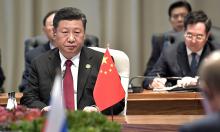Kashmirs hope for better future as Kashmir's leader stands down
Indian-controlled Kashmir's most popular leader in years was stepping down Friday under a power-sharing deal with his coalition partners, making some Kashmiris apprehensive about the continuity of his policies toward separatist militants. Violence has declined in Kashmir during Mufti Mohammed Sayeed's tenure as chief minister in India's Jammu-Kashmir state.
Sayeed's departure has created an atmosphere of uncertainty in the area, hit by a devastating earthquake this month and battered by a 15-year insurgency by Islamic guerrillas fighting for Indian Kashmir's independence or merger with mostly Muslim Pakistan.
After Jammu-Kashmir's 2002 state elections, Sayeed's People's Democratic Party and the Indian Congress party formed a coalition government there, and agreed take turns holding the state's top office.
Sayeed will hand over leadership to the Congress party, which has nominated Ghulam Nabi Azad, currently a federal minister, to take charge.
"Apart from the recent (earthquake) tragedy, a lot of critical developments took place in the last three years. There is an apprehension that a power shift could impede those developments," said Ahmed Hussain, a political analyst based in the state's summer capital, Srinagar.
However, local Congress officials insist there's no need to worry.
"There is no reason for apprehension. We have been part of the government for the last three years, and that is not going to change," said Abdul Ghani Vakil, vice president of the state Congress party. "We will follow the policies for enduring peace and for rapid development in the state."
India and Pakistan resumed peace talks last year to try ending their decades-old rivalry, which centers mostly on Kashmir, a Himalayan territory split between the nuclear-armed neighbor countries, but claimed in entirety by both.
During Sayeed's tenure, the two countries also resumed a cross-border bus service for Kashmir, and New Delhi recently began talks with separatist groups from the area.
Sayeed advocated what is being called "the healing touch policy," which stressed talking with separatists who oppose Indian control of Kashmir, and finding a way for militants to give up the insurgency that has killed more than 66,000 people, the AP says.
Rebel violence also declined during Sayeed's rule.
According to government estimates, only 1,415 incidents of violence have been reported this year, compared with 2,565 last year and 3,400 in 2003.
T.E.
Subscribe to Pravda.Ru Telegram channel, Facebook, RSS!


